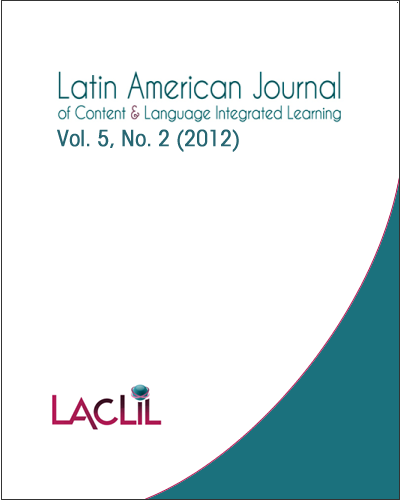Editorial introduction: A reflection on the role of foreign language learning in today’s education
DOI:
https://doi.org/10.5294/laclil.2012.5.2.11Abstract
As a guest editor of this edition of the Latin American Journal of Content and Language Integrated Learning (LACLIL), I would like to share with the readers a reflection on what I perceive as the evolving role of foreign language (FL) learning in today’s educational settings. I offer some ideas on what institutions need to consider in FL teaching and propose some questions for these to think about.
Downloads
References
Canagarajah, A. S. (2002). Critical academic writing and multilingual students. Ann Arbor, MI: University of Michigan Press.
Harrabi, A. (2009) Education in English for Specific Purposes in Tunisia: The case of the Higher Institute of Commerce of Sousse. ESP World, 27. Retrieved from http://www.esp-world.info/articles_27/abdelfatteh.pdf
Harwood, N., & Hadley, G. (2004). Demystifying institutional practices: critical pragmatism and the teaching of academic writing. English for Specific Purposes, 23(4), 355–377. doi:10.1016/j.esp.2003.08.001
Hyland, K. (2002). Specificity revisited: How far should we go now? English for Specific Purposes, 21(4), 385–395. doi:10.1016/S0889-4906(01)00028-X
Pennycook, A. (1997). Cultural alternatives and autonomy. In P. Benson & P. Voller (Eds.). Autonomy and independence in language learning (pp. 35-53). Harlow, England: Longman.
Ruane, M. (2003). Language centres in higher education: Facing the challenge, ASp, 41-42, 5-20. doi:10.4000/asp.1127
Downloads
Published
How to Cite
Issue
Section
License
This Journal and its articles are published under the Creative Commons CC BY 4.0 DEED Attribution 4.0 International license. You are free to: Share — copy and redistribute the material in any medium or format for any purpose, even commercially. Adapt — remix, transform, and build upon the material for any purpose, even commercially. The license cannot revoke these freedoms as long as you follow the terms of the license.








